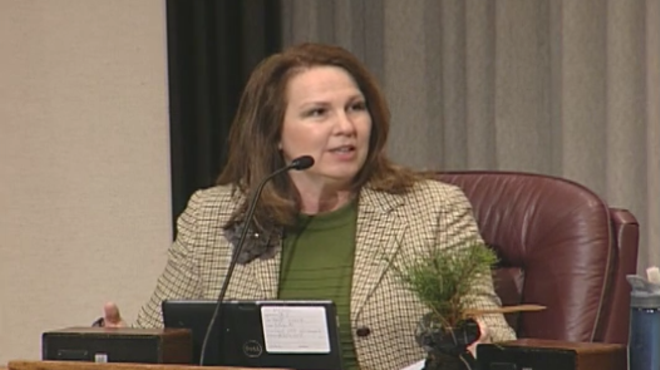
Just shy of a million: $955,661. That's what the part-time Spokane City Council is expected to cost this year, including salaries, benefits and full-time assistants.
The number has been ticking up steadily since 2006, when the council cost $666,600. Has it been worth it? That's the discussion conservative councilmembers Steve Salvatori and Mike Allen hoped to spur when they introduced a resolution this month to put advisory votes on the November ballot asking citizens whether the city council should work and be paid as full-time employees. But the effort was thwarted Monday when the council's left-leaning majority voted to defer the resolution for a year, arguing it was a distraction from other business, specifically from parks and streets measures likely to appear on this fall's ballot.
"How many things do you want to throw at people?" says Councilwoman Amber Waldref.
"If you gave citizens a hundred issues the city deals with, this would be No. 100," says Council President Ben Stuckart. "They are more worried about their streets, public safety, downtown, jobs and economic development. This isn't a conversation coming from the public."
"That's bullshit," counters Salvatori. "Really, they're too busy? They want to just ooze on to full time, spending hundreds of thousands of dollars, and they're too busy to ask the citizens?"
The oozing he's referring to is that overall growth of the council budget, though that growth has come more from changes to councilmembers' assistants than the salaries of the councilmembers themselves. In 2006, councilmembers shared one assistant. Since then, the system has shifted to one assistant per councilmember, and those assistants have gone from part-time to full-time, a move Salvatori and Allen argued against. (Salvatori still doesn't have an assistant, saying he doesn't need one and prefers to divvy up the money for social and economic development causes instead.)
Today, the City Charter doesn't explicitly state how much time the council is expected to work, but it's long been paid as part-time, at least to councilmembers, who make $30,000 annually. Stuckart, who represents all districts, is paid $55,000 and says he views that as full-time pay. (Those salaries will soon increase 4 percent to $31,200 and $57,200, after a recent Salary Review Commission decision.)
In Seattle, where the council is full-time, councilmembers make about $117,000 a year. Boise and Tacoma, the regional cities to which Spokane is often compared, both have part-time councils. Lynn Nordby, a consultant with the Municipal Research and Services Center, a Seattle-based nonprofit that provides research to local governments, says a city's size is likely the primary factor determining how much time councilmembers are expected (and paid) to devote. And while he's careful to say he can't speak definitively, Nordby adds that having full-time assistants dedicated to each councilmember is rare, even in larger cities.
Allen and Salvatori argue that the budget growth is a sort of "mission creep" — a gradual move toward a full-time city council without an explicit change — but Waldref says the full-time assistants are a necessary result of the switch to a strong mayor system, in which the council operates separately from the administration.
"The mayor has 2,000 employees working for him, running the city. We're another branch trying to enforce laws and spend the money," Waldref says. "You can't rely on staff. [They] don't work for you."
On the question itself — whether Spokane has grown to the point of needing, and being able to pay, a full-time council — councilmembers are hesitant to commit. Salvatori and Allen say they see the value in part-time positions because it encourages people with connections to the outside world to lead in City Hall. Waldref says she would like to see the Salary Review Commission take up the question in a few years. Councilman Jon Snyder, who last summer sold the local outdoor magazine he founded to focus more on city work, says he'd like to see a broad discussion of the question and the mayor's salary (which is just $8,000 less than the mayor of Seattle's) during future budget talks.
But on the dais Monday, political heartburn doomed the resolution as much as real disagreement about whether the question was valid. Other councilmembers say they felt blindsided when Salvatori sent the resolution to media before discussion among the council. Just before the vote, when Salvatori expressed frustration that the resolution looked likely to fail, Snyder told him sharply, "The next time you drop something and give it to the Spokesman-Review before us, you can expect a similar reaction." ♦





















